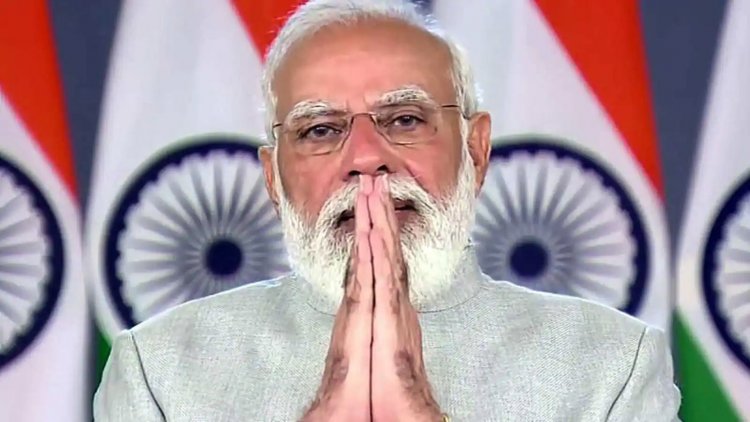Sydney Dialogue: PM On Cryptocurrency & India’s Digital Landscape
STORIES, ANALYSES, EXPERT VIEWS

In a virtual address at the Sydney Dialogue hosted by the Australian Strategic Policy Institute, Prime Minister Narendra Modi Thursday urged all democratic nations to work together to ensure that cryptocurrency does not end up in the wrong hands, cautioning that it can spoil the youth. He said the digital age is changing everything as it has redefined politics, economies and societies and has raised new questions on sovereignty, governance, ethics, rights and security.
“We are in a time of change that happens once in an era. The digital age is changing everything around us. It has redefined politics, economy and society. It is raising new questions on sovereignty, governance, ethics, law, rights and security.”
The Sydney Dialogue was held from November 17-19. It is an initiative of the Australian Strategic Policy Institute. It aims to bring together political, business and government leaders to debate, generate new ideas and work towards common understandings of the opportunities and challenges posed by emerging and critical technologies.
Five major transitions taking place in India’s digital landscape
Speaking about India’s own digital revolution, PM Modi explained that it is rooted in “democracy, demography and the scale of its economy”. “It’s powered by enterprise and innovation of our youth.”
He outlined the five major transitions taking place in India’s digital landscape at present. The first big change is the country’s growing public information infrastructure. “We’re on our way to connecting 600,000 villages, used technology to deliver over 1.1 billion doses of vaccines across India using Cowin and Aarogya Setu,” he said.
Next is the role digital technology has played in governance for greater empowerment, connectivity, delivery of benefits and welfare.
India also has the world’s “third-largest and fastest-growing” digital ecosystem, he pointed out. “New unicorns are coming up every few weeks to provide solutions to everything from health to national security,” the prime minister said.
“Fourth transition- India’s industry and services sectors are undergoing massive digital transformation using technology for conversion of resources and protection of biodiversity,” he added.
The final transition is India’s growing investment in developing telecom technology, including 5G and 6G. The country is also one of the leaders in developing artificial intelligence, he said.
PM Modi said that in view of all these changes both at home and abroad, it is essential for democracies to work together. “It should also recognise national rights and promote trade, investment and larger public good,” he said.
Modi's address was preceded by introductory remarks by the Australian Prime Minister Scott Morrison.
RBI raises concerns over cryptocurrencies
Separately, Tuesday, RBI Governor Shaktikanta Das raised concerns over cryptocurrencies. “There are serious concerns on macro-economic and financial stability”, he said. The governor’s comments come days after a meeting chaired by the prime minister reportedly arrived at a consensus that steps taken by the government in the field of cryptocurrency should be “progressive and forward looking”. While the central bank is right to advise caution, an outright ban, even if enforceable, is not a prudent way forward, writes The Indian Express. “Considering the nature of cryptocurrencies, restrictions on such transactions may end up having the opposite effect, pushing them beyond the realm of scrutiny and making it harder to enforce the law in case of felony.”
Globally, there does not appear to be uniformity in the regulatory approach towards cryptocurrencies. In India, the RBI had barred all banks from dealing in cryptocurrencies in 2018 but this was struck down by the Supreme Court in 2020. However, even as the central bank has voiced its concerns, the underlying blockchain technology does find support.
Regulating cryptocurrencies: Much depends, says the paper “on how a country views cryptocurrency — as a currency, an asset or a commodity? How it is classified will in turn determine the regulatory architecture, and thus the tax treatment. There are indications that the Indian government is likely to introduce a Bill on cryptocurrencies in the winter session of Parliament. Reports also suggest that the government could classify crypto exchanges as e-commerce platforms. But doing so would also raise questions about who would be the appropriate regulator.”
Genuine fears: The Tribune notes “fears over the use of cryptocurrencies for unlawful activities such as money laundering and terror financing have prompted several countries, including China, Russia, Nigeria and Turkey, to curb or prohibit trading in bitcoin and other digital currencies. However, there are reports that cryptocurrency trading continues to thrive in Nigeria — with transactions worth $400 million being conducted last year — as wily traders have found ways to circumvent the ban, exposing more people to online fraud.
“Lack of transparency in the evolving crypto industry makes foolproof regulation or prohibition an onerous task. Volatility of cryptocurrencies is another vital aspect — you never know when the bubble will burst……..”
Latest thinking of government on cryptocurrencies: Meanwhile, according to a recent report, India is likely to bar the use of cryptocurrencies for transactions or making payments, but allow them to be held as assets like gold, shares or bonds. The report, citing sources familiar with the government's thinking, said this approach would avoid implementing a complete ban, though the government was keen to stop crypto companies, including exchanges and platforms, from actively trying to attract new investors.
India's digital currency market was worth $6.6 billion in May 2021, compared with $923 million in April 2020, according to blockchain data platform Chainalysis.
















